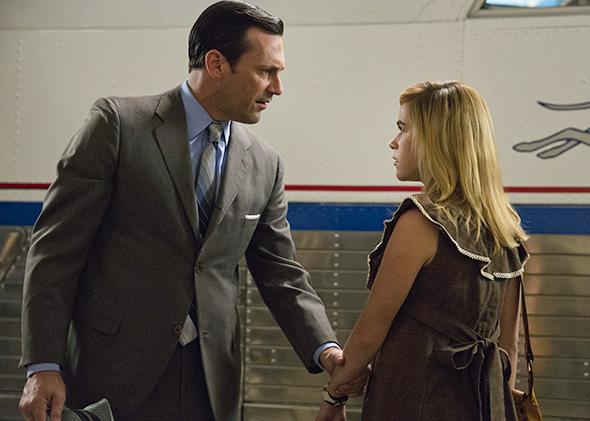Julia, John,
John, you’re beginning to sound like Sally, all petulance and biting wit! Pretty soon you’ll just bang out on your keyboard that we’re “f–king stupid” and give up on us. Like Julia, I thoroughly enjoyed this episode, not because I found it hopeful, but because I found Don’s wrestling with his new identity poignant and not at all heavy-handed. Don essentially failed his assignment; he couldn’t come up with his Gettysburg Address. He couldn’t even make it past the headline! All he could manage was to lie on the couch and elaborately procrastinate by coming up with different synonyms for what it was he was supposed to be doing (prognosticating, painting a picture, “four score and seven years ago. We know where we’ve been. We know where we are.”) When he was interviewing his colleagues about their hopes and dreams, his prods were so vague and futuristic that I felt like he was channeling Chris Anderson, the founder of TED.
What I took from this was that while Don now has a healthier way of looking to the future, as you both pointed out, he might only achieve that by sacrificing his charisma. Without his secrets, he may have lost the force that propelled him. The subtle change in Don this episode was that he ceased to be a creative genius who can always, no matter what, pull one out by deadline. Instead he became a competent manager. He served the same function Joan once did, calming tempers, giving advice, putting out office fires. Don in fact gave Mathis excellent advice, which was to come up with his own unexpected joke to ease the tension in the room. Mathis failed not only because he lacks Don’s good looks and charisma, but also because the peanut butter cookie guys lack the reckless instincts and charisma of Lee Garner Jr., the boy tyrant of Lucky Strike. What Don is wrestling with is, as always on Mad Men, what the culture is wrestling with. It’s a different age. Larger-than-life personalities no longer rule. Bold moves aren’t rewarded. When you ask someone now what his dream is, he might very well answer, “To land a pharmaceutical.” Is that all there is?
If the bold ambitions reside anywhere, they are with Peggy. She surprises Don by saying, straightforwardly, that she’d like to be the first female creative director at the agency. (And then matches his TED vibe by mentioning a “big idea” and something of “lasting value.”) This is one of the plot lines I found tedious. Sometime I feel like Matt Weiner lets the men work out their conflicts delicately while the women sound like anecdotes out of the Center for Work and Family. Joan faced the classic baby versus boyfriend dilemma. Only it didn’t really feel like much of a dilemma, because we never got to experience the maternal bond. She yelled at the baby-sitter, said a late goodbye to her son, but never got in close enough physical proximity to him for us to feel her being torn. And did she really say she was thinking of “sending him away”? What could that possibly mean? Where would you send away a 4-year-old? And would anyone really do that for someone she’s only known for a week?
I have to say that I’m always happy when Sally’s onscreen. I love watching her watch her parents, feeling amused, puzzled, disgusted, and ultimately puncturing whatever glamorous fantasy they are in the middle of creating for themselves. As she says to Betty, who is, to her horror, flirting with Glen: “Mom. Can I have some actual money?”
It’s really not a fair fight between Sally and Betty, because Betty never changes or sees past her self-regard. She remains as stiff as her bouffant and her starched skirt, somehow trapped in an earlier decade, and in her 15-year-old self. Julia, I didn’t think Betty even touched maturity in that scene with Glen. He asked why they couldn’t kiss, and her first answer was, “I’m married.” Oh, really, is that the main reason? At least when Don flirts with a teenager he knows he’s participating in theater. Betty answers as if the moment is real. Sally, meanwhile, always flirts with bratty rebellion but then breaks down and makes the teary phone call to apologize. She is already more mature than her mother. Don is half right—she may or may not end up like the two of them, but she is ever the dutiful first child.
I just want dinner,
Hanna
